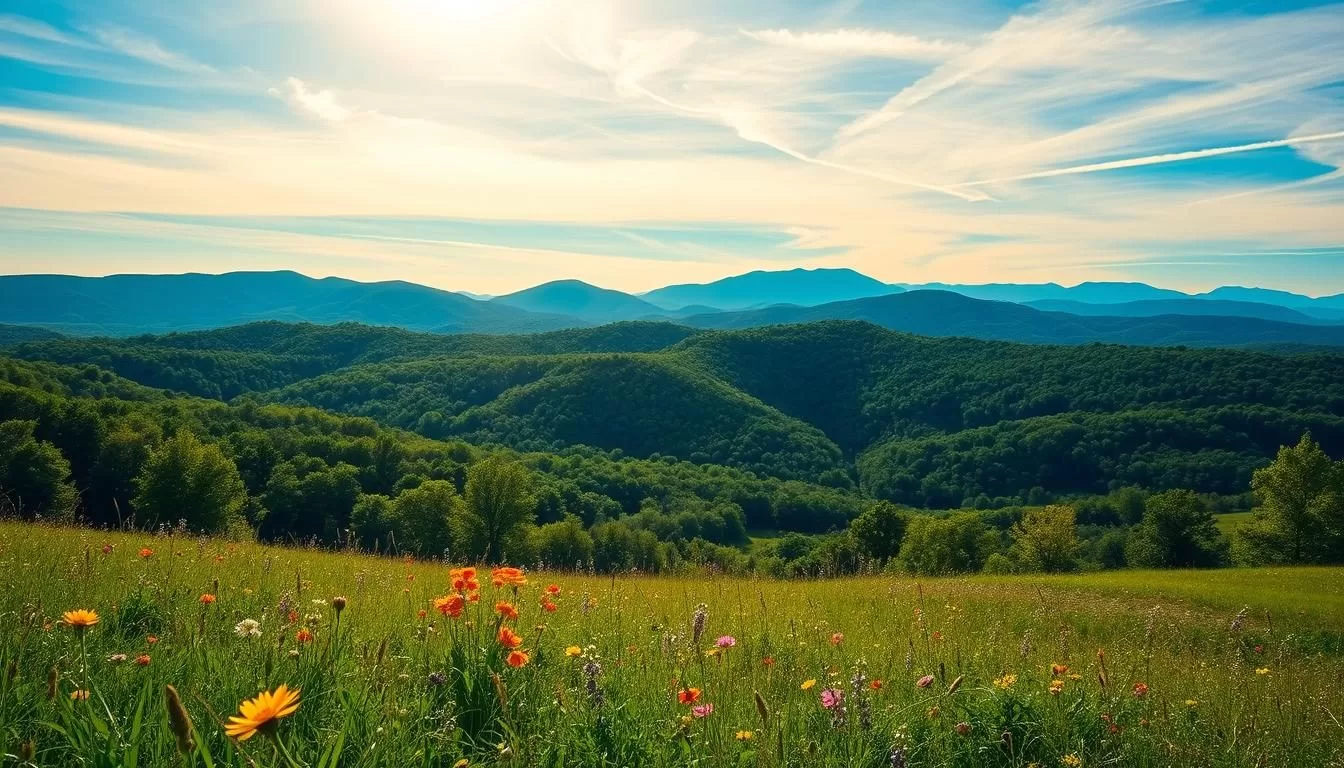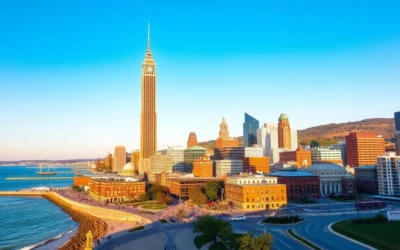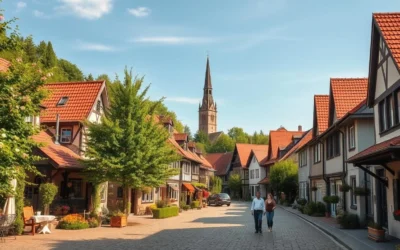Planning a trip to Ohio can be a delightful experience, given the state’s diverse weather conditions throughout the year. With four distinct seasons, you’ll find a range of outdoor activities and recreational opportunities.
Understanding the weather patterns in Ohio is crucial to making the most of your visit. The state’s summer months can be hot and humid, while winters are typically snowy and cold. In contrast, spring and fall offer milder temperatures, making them ideal for certain activities.
As you plan your trip, considering the various months and their characteristics will help you choose the best time to enjoy Ohio’s natural beauty and cultural attractions.
Understanding Ohio’s Weather Patterns
Understanding the weather patterns in Ohio is crucial for planning a trip that aligns with your preferences. Ohio’s location in the Midwest means it experiences a diverse range of weather conditions throughout the year, influenced by its geographical position and major weather systems.
Northerly winds bring warmer, wetter air from the Gulf of Mexico, while southern streams can bring down chilly Arctic air from Canada. This clash of air masses contributes to the state’s varied weather patterns. Located in the Eastern U.S. time zone, Columbus lies on a nearly 40-degree latitude line and follows Daylight Savings Time, with the days being shortest in December and longest in June.
Four Distinct Seasons in the Midwest
Ohio experiences all four seasons distinctly, with each offering its own unique weather patterns and characteristics. The state’s location in the Midwest creates a climate with hot, humid summers and cold, snowy winters, with transitional spring and fall seasons. You’ll notice the changing temperatures as the seasons progress, with summer being the warmest and winter being the coldest.
The transitional seasons, spring and fall, offer mild temperatures, making them ideal for outdoor activities. Spring brings rejuvenation with blooming flora, while fall is known for its vibrant foliage.
Impact of Lake Erie on Northern Ohio’s Climate
The significant impact of Lake Erie on northern Ohio’s climate is a crucial factor to consider. The “lake effect” can dramatically increase snowfall in certain regions, making some areas more prone to heavy snowfall during the winter months. This phenomenon occurs when cold air passes over the warmer waters of Lake Erie, picking up moisture and resulting in significant snowfall when it reaches the land.
To illustrate the impact of Lake Erie, consider the following table, which compares snowfall in different regions of Ohio:
| Region | Average Snowfall (inches) | Lake Effect Influence |
|---|---|---|
| Northern Ohio | 40-60 | High |
| Central Ohio | 20-40 | Moderate |
| Southern Ohio | 10-20 | Low |
Ohio’s Climate Overview by Region
Ohio’s diverse geography significantly influences its climate, resulting in varied weather conditions across different regions. The state’s location in the Midwest, with its proximity to Lake Erie in the north, contributes to a range of climate characteristics.
Northern Ohio: Lake Effect Weather
Northern Ohio, particularly around Cleveland, experiences a unique “lake effect” weather pattern due to its proximity to Lake Erie. This results in cold and snowy winters, with significant snowfall on the east side of the city. Winters can be harsh, with temperatures dropping to around 23°F in January. The temperatures and snowfall in this region are significantly different from other parts of the state.
- The “lake effect” phenomenon brings heavy snowfall to areas near Lake Erie.
- Cold air passing over the warmer lake waters results in significant snowfall.
Central and Southern Ohio Climate Characteristics
In contrast, Central and Southern Ohio have more moderate climates compared to the north. While they still experience the four distinct seasons, the variations are less extreme. Central Ohio, where Columbus is located, enjoys a relatively balanced climate, whereas Southern Ohio is slightly warmer, somewhat similar to the climate patterns observed in states like New Mexico during certain times of the year, though Ohio’s overall climate is more dynamic.
Understanding these regional differences is crucial for planning a trip to Ohio, much like one would research the climates of North Dakota or South Dakota before visiting those states. By knowing what to expect in different parts of the state, you can better prepare for your journey.
Summer in Ohio: June Through August
Ohio shines bright during the summer season, offering a plethora of activities and events that make the most of the warm weather. You can enjoy the state’s beautiful outdoors, from lakefront fun to hiking trails, and experience the vibrant cultural scene.
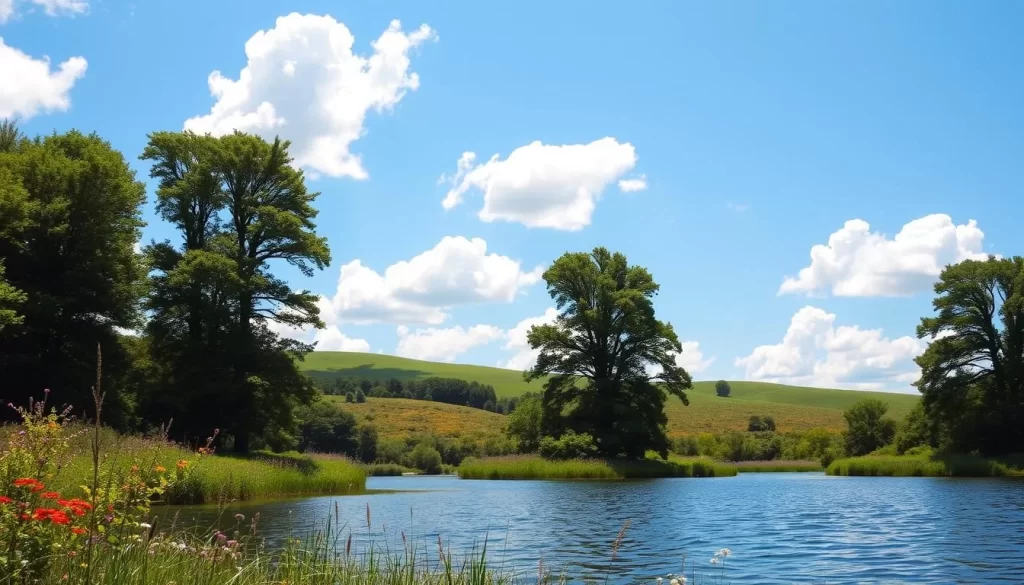
Temperature and Humidity Expectations
During the summer months, Ohio’s temperatures often reach the 80s°F (around 30°C), accompanied by higher humidity levels. It’s not uncommon for the weather to be hot and humid, especially in July and August, which are typically the peak summer months.
Summer Outdoor Activities and Attractions
Summer is an ideal time to explore Ohio’s outdoors. You can enjoy lakefront recreation, outdoor concerts, and cultural festivals. Cleveland, in particular, comes alive with numerous festivals, concerts, and lake activities that cater to all interests. It’s a great time to be outside with family and friends, making the most of the warm days.
Preparing for Summer Thunderstorms
While summer offers plenty of sunshine, it’s also a season for occasional thunderstorms. To make the most of your visit, it’s essential to be prepared for these sudden weather changes. Staying informed about local weather forecasts and having a plan for indoor activities during storms can help you navigate these interruptions.
By understanding what to expect from Ohio’s summer weather, you can better plan your trip and enjoy the wide range of activities the state has to offer during this time.
Fall in Ohio: September Through November
From September to November, Ohio experiences a beautiful fall season with comfortable temperatures and stunning foliage, making it one of the best times to plan your trip. As the summer heat dissipates, the state transforms into a kaleidoscope of autumn colors, attracting visitors from all over.
Fall Foliage and Harvest Season
The fall season in Ohio is renowned for its spectacular foliage. The changing leaves create a picturesque landscape, perfect for scenic drives, hiking, and photography. The peak foliage times vary across the state, depending on the region and elevation. Ohio’s harvest season is also a significant part of its fall charm, with numerous apple orchards, pumpkin patches, and corn mazes open to visitors.
During this time, you can enjoy a variety of harvest activities, such as picking fresh apples, exploring pumpkin patches, and navigating through corn mazes. These activities not only provide entertainment but also give you a taste of Ohio’s agricultural bounty.
Temperature Fluctuations and What to Pack
Ohio’s fall weather can be quite unpredictable, with significant temperature fluctuations. One day can be warm enough for shorts and dresses, while the next day requires long pants and jackets. It’s not uncommon for bursts of hot temperatures to last into early November. Conversely, the first snowfall can occur as early as October, although this is less common.
To be prepared for your trip, it’s advisable to pack layers, including both warm and cool clothing. This will allow you to adjust your attire according to the day’s weather conditions.
Autumn Festivals and Events
Ohio celebrates the fall season with a wide range of autumn festivals and events. You can experience the unique Woollybear Festival or attend the impressive Cleveland Air Show, both of which are fantastic ways to enjoy the fall season. Additionally, various harvest festivals take place throughout the state, offering a chance to savor local foods, crafts, and entertainment.
These events are a great way to immerse yourself in Ohio’s culture and community spirit during the fall. Whether you’re interested in music, food, or family-friendly activities, there’s something for everyone at Ohio’s autumn festivals and events, all contributing to making your trip memorable under the state’s vibrant fall weather.
Winter in Ohio: December Through February
Ohio’s winter season, spanning from December to February, brings with it a mix of cold weather and festive activities. During this period, the state experiences cold temperatures, with January typically being the coldest month.
Snowfall Patterns and Cold Temperatures
Ohio’s weather during winter is characterized by significant snowfall, particularly in the northern regions due to the lake-effect snow from Lake Erie. The snowfall amounts can vary greatly across the state, with areas near Lake Erie receiving more snow than those in the south. Cold temperatures are a hallmark of Ohio’s winter, with averages ranging from the mid-20s to low 30s Fahrenheit (-4 to 0 degrees Celsius) in different parts of the state.
Winter Recreation Opportunities
Despite the cold, Ohio offers a variety of winter recreation opportunities. You can enjoy skiing, snowboarding, and sledding at various ski resorts and parks. Ice skating is another popular activity, with many outdoor and indoor ice rinks available throughout the state. For instance, the Blue Jackets NHL team plays at Nationwide Arena in Columbus, providing an exciting indoor activity during the winter months.
Holiday Celebrations and Indoor Attractions
Winter in Ohio is also a time for festive holiday celebrations and enjoying indoor attractions. Many cities and towns host holiday markets, light displays, and other events. You can visit local museums, attend theater performances, or explore indoor shopping centers to escape the cold. Ohio’s indoor attractions, such as those in Columbus, Cleveland, and Cincinnati, offer a warm and comfortable experience during the coldest months of the year. Comparatively, Ohio’s winter experience can be likened to neighboring states like West Virginia and New Jersey, where winter sports and holiday festivities are also prominent.
Spring in Ohio: March Through May
As spring unfolds in Ohio, the state’s landscape transforms with vibrant colors and renewed energy. The second temperatures start to warm up, residents emerge from their cozy winter cocoons to enjoy the outdoors. In Columbus, for example, the Short North Arts District boutiques beckon with the latest seasonal fashions, while North Market and local farmers markets offer tasty, locally sourced lunches.
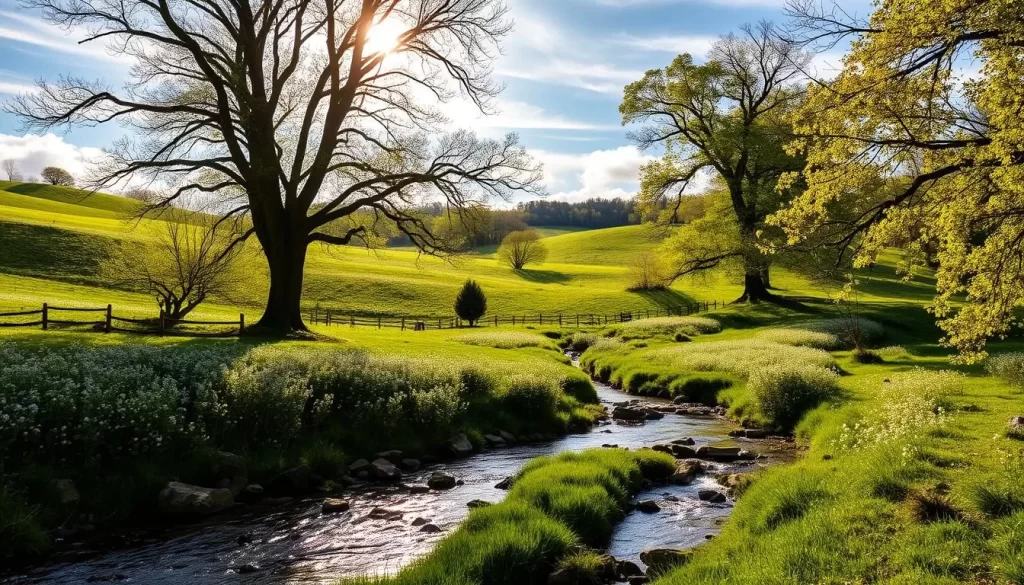
Spring Blooms and Rejuvenation
During spring, Ohio’s natural beauty is on full display. The progression of spring flowers and blossoming trees makes this season visually stunning throughout the state. Daffodils and tulips bloom, adding vibrant colors to the landscape. The Franklin Park Conservatory in Columbus is a must-visit, showcasing a variety of spring blooms in a serene environment.
Foot and bike traffic increases at the city’s Metro Parks, as people take advantage of the warmer weather to engage in outdoor activities. This rejuvenation is not limited to the natural landscape; it also reflects in the community, with outdoor festivals and events starting to bloom.
Dealing with Spring Rain and Temperature Swings
While spring brings many pleasant days, it also comes with characteristic rain showers and sometimes dramatic temperatures swings. To make the most of the season, it’s essential to be prepared. Layering clothing is a practical strategy to adapt to the variable weather conditions. Having backup plans for rainy days ensures that outdoor activities are not dampened by the rain.
Springtime Events and Activities
Springtime in Ohio is celebrated with various events and activities. From flower festivals to outdoor markets, there’s something for everyone. The changing weather brings a sense of renewal, and communities come together to enjoy the season. Whether it’s visiting a local festival or simply enjoying a walk in the park, spring in Ohio offers a fresh start.
Although the main focus is on Ohio, travelers from places like Rhode Island or the U.S. Virgin Islands might find the spring experience in Ohio quite different, yet welcoming.
Ohio, United States: Best Months for a Weather-Savvy Trip
For a weather-savvy trip to Ohio, it’s essential to know which months offer the most pleasant conditions. Understanding the state’s climate patterns can help you plan a more enjoyable journey.
Early Fall: The Prime Time to Visit
Early fall, particularly September, is widely regarded as the prime time to visit Ohio. The weather is comfortable, with mild temperatures and lower humidity, making it ideal for outdoor activities. You can enjoy the beautiful fall foliage, harvest festivals, and various cultural events that take place during this time.
September is a great time to visit Cleveland, as the city is still bustling with activities, and the weather is lovely. The fall foliage adds a picturesque backdrop to your trip, and the harvest festivals make the city a cozy and welcoming place.
| Month | Average High Temperature | Average Low Temperature | Precipitation |
|---|---|---|---|
| September | 75°F (24°C) | 55°F (13°C) | 3.5 inches (89 mm) |
| October | 65°F (18°C) | 45°F (7°C) | 3.2 inches (81 mm) |
| November | 55°F (13°C) | 40°F (4°C) | 3.8 inches (97 mm) |
Late Spring: A Close Second
Late spring, particularly May, is considered the second-best time to visit Ohio. As temperatures warm up and flowers bloom across the state, the scenery becomes particularly picturesque. May offers a great balance of pleasant weather and outdoor activities, making it an excellent choice for your trip.
Key benefits of visiting in late spring include: mild temperatures, blooming flora, and a range of outdoor events and festivals.
By considering these factors, you can plan your trip to Ohio during the most favorable months, ensuring a memorable and enjoyable experience.
Planning Around Ohio’s Major Cities
When planning a trip to Ohio, understanding the weather patterns across its major cities can significantly enhance your travel experience. Ohio’s climate varies across different regions, making it essential to consider the local weather conditions when planning your itinerary.
Columbus Weather Considerations
Columbus, the state capital, is known for its vibrant outdoor activities. You can enjoy lakefront activities, explore lush hiking trails, and experience the city’s vibrant sports scenes. However, the weather in Columbus can be quite varied. Summers are warm and humid, while winters can be cold. Understanding these patterns can help you pack accordingly and make the most of your visit.
For instance, if you’re visiting in the summer, be prepared for potential thunderstorms. In contrast, winter visits might require you to bundle up for cold temperatures. Spring and autumn are generally mild, making them ideal for outdoor activities.
Cleveland and Cincinnati Climate Differences
Cleveland and Cincinnati, while both major cities in Ohio, have distinct climate characteristics. Cleveland, being closer to Lake Erie, experiences a lake-effect climate, which can result in significant snowfall during winters. Cincinnati, located in the southern part of the state, tends to have milder winters compared to Cleveland.
When planning a multi-city trip to Ohio, considering these climate differences is crucial. For example, if you’re traveling to Cleveland in winter, be prepared for potential snow. In contrast, Cincinnati’s weather during the same period might be relatively more pleasant.
By understanding these regional weather variations, you can better plan your activities and make the most of your visit to Ohio’s major cities, enjoying all that the United States has to offer in this vibrant state, which is as diverse as traveling from New Hampshire to New York in terms of climate and attractions.
Outdoor Adventures Based on Weather
The state’s varied climate and geography make it an ideal destination for outdoor enthusiasts who can adapt their plans according to the weather. Ohio’s diverse landscape offers numerous opportunities for outdoor activities that can be enjoyed year-round, with the right preparation.
Hiking and State Parks Year-Round
Ohio is home to many excellent hiking trails and state parks that can be enjoyed in every season. In the Cuyahoga Valley National Park, you can hike through stunning scenery and discover waterfalls. The Cleveland Metroparks also offer many trails to explore, with the added benefit of varying landscapes that change with the seasons. During summer, the lush greenery provides a cool respite, while fall brings vibrant colors to the trails. In winter, the parks transform into a serene landscape, ideal for snowshoeing or cross-country skiing. To make the most of your hiking experience, it’s essential to check the weather forecast and prepare accordingly.
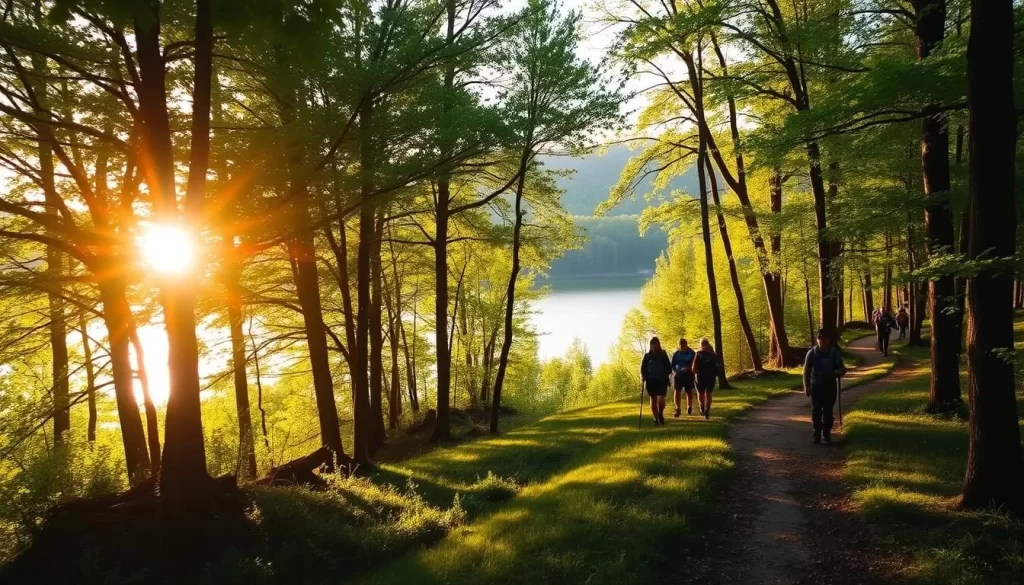
Water Activities on Ohio’s Lakes and Rivers
Ohio’s lakes and rivers offer a variety of water activities that are perfect for summer. The shores of Lake Erie are particularly popular for swimming, sunbathing, and water sports like kayaking or paddleboarding. A relaxing boat tour or a leisurely walk by the water can showcase the city’s beauty. Cleveland’s beaches are great spots to enjoy the sun and the view. For those looking for other water activities, Ohio’s rivers provide excellent opportunities for fishing and boating. Understanding the weather conditions is crucial for a safe and enjoyable experience on the water.
By adapting your outdoor plans to the weather, you can maximize your enjoyment and safety while exploring Ohio’s natural beauty.
Indoor Attractions for Inclement Weather
You don’t have to let bad weather ruin your trip to Ohio, thanks to its numerous indoor attractions. Ohio is home to a wide range of museums, cultural institutions, shopping centers, and entertainment venues that are perfect for days when the weather isn’t ideal.
Museums and Cultural Institutions
Ohio boasts an impressive array of museums and cultural institutions. The Cleveland Museum of Art, located in the University Circle area, is a leading art museum featuring pieces from around the world. It is conveniently situated near the Museum of Natural History and the Children’s Museum of Cleveland, offering a variety of educational and fun experiences. These institutions provide a great way to spend a day indoors while still enjoying the rich cultural heritage of Ohio.
| Museum | Location | Focus |
|---|---|---|
| Cleveland Museum of Art | University Circle, Cleveland | Art from around the world |
| Museum of Natural History | University Circle, Cleveland | Natural history and science |
| Children’s Museum of Cleveland | University Circle, Cleveland | Interactive exhibits for children |
Shopping and Entertainment Options
In addition to its cultural attractions, Ohio also offers a variety of shopping and entertainment options. Areas like Legacy Village and Crocker Park in Cleveland feature a mix of high-end stores and local boutiques, providing something for every shopper. If you’re looking for entertainment, Cleveland’s theaters and concert halls are sure to keep you engaged. Whether you’re in the mood for a musical performance, a play, or a movie, you’ll find plenty of options to enjoy while staying dry and comfortable indoors.
With these indoor attractions, you can plan a flexible itinerary that includes backup plans for days when the weather doesn’t cooperate, ensuring a enjoyable trip to Ohio regardless of the weather.
Ohio’s Seasonal Festivals and Events
You’ll find a wide array of seasonal festivals and events in Ohio, each showcasing the state’s unique heritage. Whether you’re visiting in the summer or during another season, there’s always something happening.
Summer Festivals and Fairs
Summer in Ohio is synonymous with exciting festivals and events. In Columbus, the Columbus Arts Festival in June showcases local artists and live music. The Jazz & Rib Fest in July is another highlight, featuring barbecue and soulful jazz music. You can also enjoy lakefront fun and other outdoor activities during the summer months.
Fall Harvest Celebrations
As weather changes in the fall, Ohio hosts various harvest celebrations. Events like the Woollybear Festival and the Air Show attract visitors from around the region. You might also find apple festivals, pumpkin events, and Oktoberfest celebrations, reflecting the state’s German heritage.
Winter and Holiday Events
Winter in Ohio is festive with light displays and holiday markets. The Christmas Story5K in Cleveland is a unique event that celebrates the classic holiday film. You can also enjoy Christmas markets and New Year’s celebrations across the state, making the cold weather more bearable.
Weather-Responsive Itinerary Planning
Ohio’s diverse weather patterns mean that a flexible itinerary is key to a successful trip. To enjoy your travel experience, it’s crucial to be prepared for the weather and have plans that can adapt to changes.
Flexible Scheduling Tips
Creating a flexible schedule allows you to make the most of your trip regardless of the weather. Start by identifying activities that can be enjoyed in various conditions. For example, you can alternate between outdoor activities like visiting a park in Ohio and indoor attractions like museums or shopping centers. Using weather forecasting tools to check the forecast for the best times to engage in outdoor activities can help you plan your day effectively.
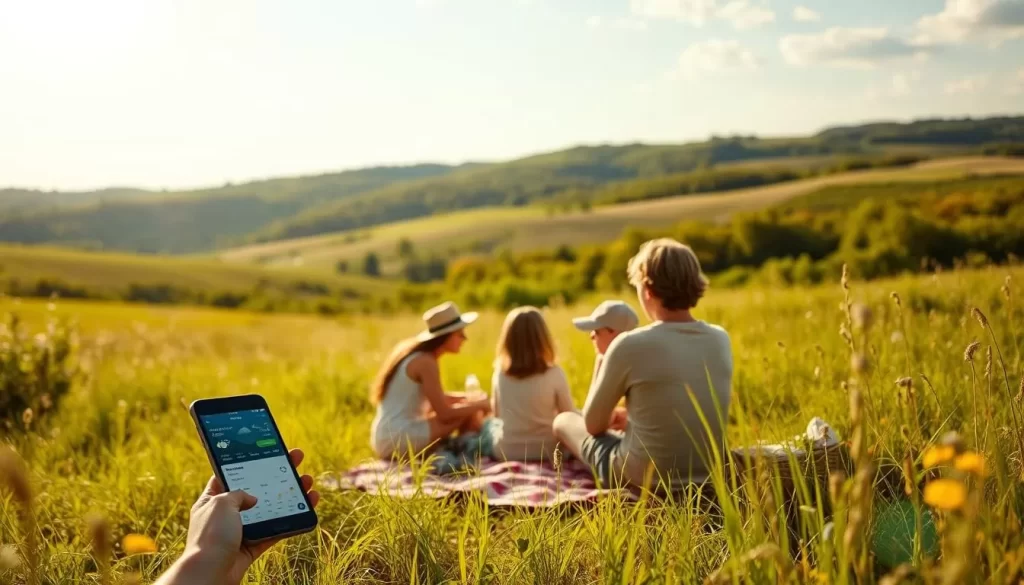
Backup Plans for Weather Changes
Despite the best planning, weather conditions can change unexpectedly. Having backup plans in place ensures that your trip remains enjoyable. Identify indoor activities or alternative outdoor activities that can be enjoyed in different weather conditions. For instance, if you’re planning to visit an outdoor attraction but the weather forecast indicates a rainstorm, you can switch to an indoor activity like visiting a local art gallery or enjoying a meal at a cozy restaurant. This flexibility allows you to have a great experience during your trip to Ohio, even during the best times for different activities.
Packing for Ohio’s Variable Weather
To make the most of your Ohio trip, understanding and preparing for the local weather is key. Ohio’s climate varies significantly across seasons, making it crucial to pack accordingly.
Seasonal Packing Lists
Creating a seasonal packing list can help ensure you’re prepared for Ohio’s weather conditions. For spring, pack versatile clothing options that can be layered to accommodate changing temperatures. Don’t forget rain gear, as spring showers are common. In summer, bring light clothes, sunscreen, and bug spray to protect against the heat and insects. For fall, include sweaters and jackets in your luggage, as temperatures can fluctuate significantly. In winter, pack warm clothes and consider Vitamin D supplements to counteract the effects of shorter days.
- Spring: Layered clothing, rain gear
- Summer: Light clothes, sunscreen, bug spray
- Fall: Sweaters, jackets
- Winter: Warm clothes, Vitamin D supplements
Layering Strategies for Comfort
Layering is an effective way to adjust to Ohio’s temperature fluctuations, particularly during spring and fall. Start with a breathable base layer, add a mid-layer for insulation, and finish with a waterproof outer layer. This strategy allows you to easily adjust your outfit throughout the day. For example, you can remove or add layers as needed to stay comfortable while exploring outdoor attractions or visiting a park in Ohio.
By packing smart and dressing in layers, you’ll be well-prepared for Ohio’s variable weather conditions, ensuring a comfortable and enjoyable trip.
Weather Monitoring Resources for Travelers
Ohio’s weather can be unpredictable, so it’s vital to have the right tools for monitoring it during your trip. Knowing the latest Cleveland weather forecasts is crucial for planning your activities and ensuring a smooth journey.
Reliable Weather Apps and Websites
For detailed updates on Ohio’s weather, look into dependable weather apps and websites. These tools will help you make plans that fit the weather each day. Some recommended weather apps include those from the National Weather Service, AccuWeather, and Weather Underground. These platforms provide accurate forecasts for Ohio’s various regions, enabling you to prepare for any weather conditions.
Local Weather Alerts and Warnings
The National Weather Service carefully monitors conditions and issues warnings accordingly to give residents and visitors as much time as possible to prepare for any approaching bad weather. Understanding Ohio’s weather alert system is crucial for responding to local weather warnings. You can receive these alerts through various channels, including emergency alert systems on your mobile device, weather radio, and local news.
| Resource Type | Examples | Benefits |
|---|---|---|
| Weather Apps | National Weather Service, AccuWeather, Weather Underground | Detailed forecasts, real-time updates, customizable alerts |
| Local Weather Alerts | Emergency Alert Systems, Weather Radio, Local News | Timely warnings, emergency instructions, weather updates |
Ohio’s Extreme Weather: What to Know
Understanding Ohio’s extreme weather patterns is key to a safe and enjoyable trip. Ohio’s climate can sometimes lead to severe weather conditions, including tornadoes and winter storms, which can impact your travel plans.
Tornado Season and Safety Precautions
Tornadoes in Ohio can occur at any time of the year, but the risk is highest from April through July. The National Weather Service plays a crucial role in monitoring weather conditions and issuing timely warnings. When a tornado watch is issued, it means conditions are favorable for tornadoes to develop. However, a tornado warning signifies that a tornado has been spotted or is imminent, and you should seek shelter immediately.
Safety Precautions:
- Stay informed through reliable weather apps and local news.
- Know the safest places to seek shelter, such as basements or windowless rooms in the middle section of a building.
- Be prepared for power outages by having a backup plan, such as a portable charger for your devices.
Winter Storms and Travel Considerations
Winter storms can significantly affect travel in Ohio, causing flight delays and hazardous driving conditions. It’s essential to check weather forecasts regularly and plan accordingly. If you must travel during a winter storm, ensure your vehicle is winter-ready, and consider purchasing travel insurance that covers weather-related disruptions.
Travel Tips:
- Check the weather forecast before heading out.
- Keep a winter emergency kit in your car, including items like a flashlight, first aid kit, and warm blankets.
- Consider alternative travel dates if a severe winter storm is forecasted.
By being aware of Ohio’s extreme weather conditions and taking necessary precautions, you can minimize risks and enjoy your trip. Whether you’re visiting during tornado season or traveling in the winter, staying informed and prepared is key to a successful and enjoyable journey.
Conclusion
With its four distinct seasons, Ohio offers a unique experience for travelers who understand the weather nuances. As you’ve learned, each season brings its own charm and activities, from the summer months filled with outdoor adventures to the cozy winter months with festive markets.
To plan a trip to Ohio that aligns with your preferences, consider the best times to visit. September stands out as a great time to enjoy the perfect weather and various activities, while still experiencing the remnants of summer. Understanding the state’s weather patterns allows you to make the most of your visit.
Here are some key takeaways to enhance your Ohio travel experience:
- Understand Ohio’s diverse weather patterns to tailor your trip accordingly.
- Choose the months that align with your preferred activities and weather conditions.
- Stay informed with reliable weather apps and local advice to adjust your plans.
By being prepared and flexible, you can enjoy Ohio’s offerings throughout the year. Whether you’re looking for outdoor adventures or cozy indoor activities, Ohio has something special for every season. So, come prepared and make memories in Ohio all year round.
The above is subject to change.
Check back often to TRAVEL.COM for the latest travel tips and deals.
Here are some Tours & Sightseeing suggestions that might pique your interests!
